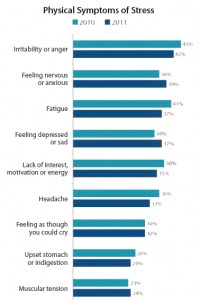The annual Stress in America survey was conducted last year within the United States under the guidance of the American Psychological Association. Over 1200 adults aged 18 and older who reside in the United States were participants of the survey.
Highlights of the Report
People suffering from depression or obesity reported significantly higher average stress levels than the rest of those surveyed.
The Stress in America Report says “Year after year, the stress in America survey paints a picture of a nation at a critical crossroads when it comes to stress and health.”
In 2011, 22% of Americans reported that they were under extreme stress at some time during the year.
44% of those surveyed say that their stress has increased over the last 5 years.
Although the majority of adults surveyed understand that stress has a strong impact on a person’s health, a sizable minority still think that stress has only a slight or no impact on their physical health (31%) and mental health (36%).
See the chart included at the right for the causes of stress that people reported.
Stress and Emotions
Americans report the following emotional symptoms of stress:
42% report irritability or anger.
37% report fatigue.
35% report a lack of interest, motivation or energy.
Stress and Physical Illness
See the chart to the left for some of the reported physical symptoms of stress. Note that these are only the short term acute physical symptoms. This chart does not reflect the physical conditions that often result from stress.
Research shows that prolonged periods of stress – which releases the hormone cortisol – can decrease proper cell function, thereby contributing to numerous emotional and physical disorders including depression, anxiety, heart attacks, stroke, hypertension and other immune system disturbances that increase susceptibility to infections.
Stress and Gender
The survey results suggest that the link between stress and physical health could be harder for men to recognize. Men are less likely than women to believe that stress can have an impact upon their health, despite the fact that there are more likely than women to report having been diagnosed with the types of illnesses that are often exacerbated by stress.
It’s probably for this reason that women are substantially more likely than men (70% versus 50% ) to say they have tried to reduce stress over the past 5 years.
“Overall, people seem to recognize that stress can have an impact on health and well-being, but they do not necessarily take action to prevent stress or managing it well.”
Stress Management
Research shows that up to 85% of visits to the doctors office are related stress-related conditions.
“Overall, people seem to recognize that stress can have an impact on health and well-being, but they do not necessarily take action to prevent stress or managing it well.”
Stress management strategies most often reported by obese adults are watching TV for more than 2 hours daily, listening to music and eating.
39% report that they over eat or eat unhealthy foods.
41% of women pray to manage their stress versus 22% of men.
24% of women say they go to religious services to manage stress versus 17% of men.
5% of the women surveyed say they see a mental health professional to manage their stress versus 1% of men who do the same.
Faith and Stress – How To Manage Stress
There are many faith-related measures – or spiritual exercises – that a believer can take or apply to manage their stress. I’ll mention just a few of the key ones here. Some of them are attitudes and beliefs that can positively impact on how we deal with stress.
- Prayer is one stress management strategy reported in the report.
- Attending worship services was the other strategy mentioned that falls under the realm of faith. Otherwise, the report does not address the role that faith might play in managing stress.
- Trust God – If we trust God, and believe that he is in control and that he’ll provide for our needs, we will be less likely to be anxious or to worry. Worry and anxiety are two ways many people respond to the stress in their lives.
- Be Dependent on God – Often we try to muster up all the inner strength we can muster to deal with the stress and associated circumstances in our life. Throughout God’s Word, he encourages us to surrender on a deeper level, to be humble, to depend on him.
- Live By the Power of the Holy Spirit – In conjunction with Be Dependent on God, we can better manage our stressors if we ask God to live through us. His Spirit in us is the same Spirit that raised Jesus from the grave. The apostle Paul encourages us to live by God’s Spirit.
- Abide in Jesus – Jesus tells us in John 15 to remain in him because apart from him we can do nothing. Apart from Jesus, we are not going to be able to manage all that life throws at us, including the stress in our life.
These are just six of the many important principles that God’s Word has to say about how to live life that will impact on our ability to manage stress. The more we embrace God’s truths of the Christian faith, and apply them, the better we’ll be able to manage the stress that is in our lives.
God gives us his instructions for living because he knows that if we live by them, we’ll be better able to manage the stress in our life. God wants our faith to be a resource to manage our stress in a healthy way.
My contention is that our ability to manage the stress in our life will largely determine our health status.
Then Jesus said, “Come to me, all of you who are weary and carry heavy burdens, and I will give you rest. Take my yoke upon you. Let me teach you, because I am humble and gentle at heart, and you will find rest for your souls. For my yoke is easy to bear, and the burden I give you is light.”
Matthew 11:28-30
Resources Related to Stress
1 page article: Manage Your Stress with God’s Help
A page on this Website: Stress and Health – A Christian Perspective
15 Scriptures to Help With Anxiety, Worry and Stress
Our Faith and Health Ambassador Course teaches Ambassadors all about stress and health and how applyng 40 Biblical principles can help a person live a full life.









